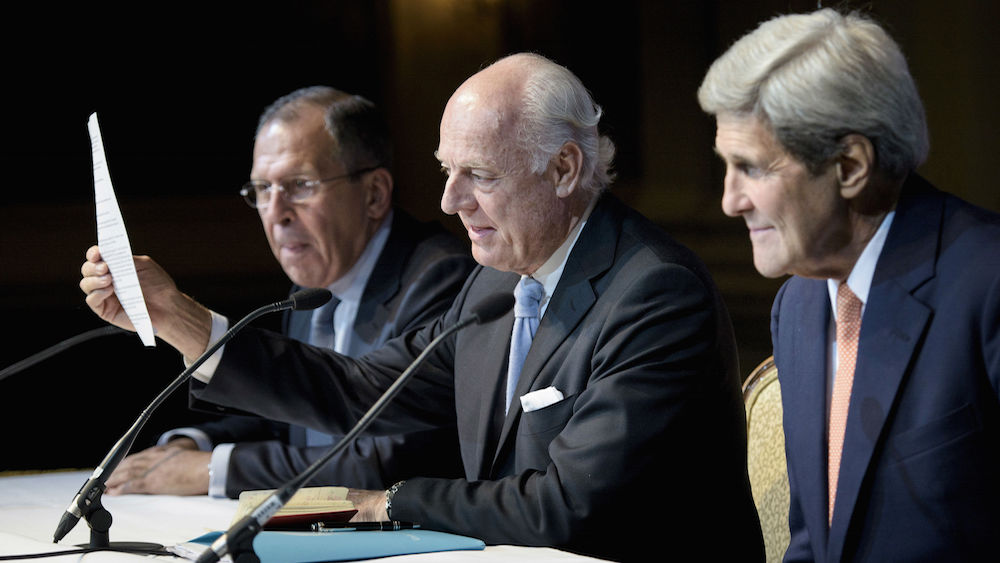After hundreds of thousands of dead, and millions of refugees, the EU urgently needs to take the lead in ending the brutal civil war in Syria that has transformed the country into a geopolitical battleground.
Now that Germany has decided to contribute to anti-IS operations in Syria, the key question is how to end the Syrian civil war, after our collective failure to confront this task for over four years. This is the challenge facing the entire international community. Aside from a few meetings and a UN Security Council resolution within the framework of the Vienna Process, a credible and sustainable approach to ending the civil war, combining political, financial, military, and regional elements still waits to be developed.The Bundeswehr operation is being undertaken in the framework of an alliance against terror, an alliance that is meant to fight and diminish the so-called Islamic State (IS), but not really to end the civil war. Combatting IS, however, should be only one element – albeit an important one – of a comprehensive strategy to end the war and to establish a post-war order in Syria. And the latter must be approached in steps: it is important that Bashar al-Assad will no longer be the head of a future Syrian government. When that is accomplished, a strategy for the reconstruction and stabilization of Syria must be implemented – otherwise any anti-terror strategy will only be tilting at windmills, as Islamic fundamentalism will continue to feed off ongoing conflicts in the region’s several failed states.
The current military activity is not entirely without logic; but unless this anti-terror operation is paired with a regional peace and rehabilitation strategy, it will not pacify the region or contain terror in the medium- or long-term.
That said, rebuilding Syria will cost a great deal of money. Syria is a devastated country. But we don’t have the luxury to decide if we want to take on another nation-building project post-Afghanistan; there is simply no alternative here. Along with the problems created by Russia’s actions in Ukraine, the war in Syria is yet another fundamental, perhaps even historic threat to the European Unionʼs cohesion and existence.
In the first EU security strategy paper released in 2003, it was stressed that the EU should strive to establish a “ring of well-governed states” to the East and to the South. We have such a ring – but only as long as we are talking about current or near-future EU member states. Even there, we have not yet exactly achieved our goal.
The reality is that the vision of the European Union established 12 years ago – a union that would be surrounded by a cordon of stability, growing prosperity, and cooperation, both with the Mediterranean countries in the South and South East and the post-Soviet countries in the East – has broken down completely. Thus the question of Syria must be tied into a broader review of European security planning. It is time to revise the previous strategy, and to ask what went wrong and why.
If the EU wants to claim and show that it has a common foreign policy, it must do more than provide a selective response to a terrorist attack in Paris. This will be the great task of the EU over the coming years – developing a long-term strategy, for which a great deal of resources and engagement will be required aside from funds needed for military engagements.
Because of the relative withdrawal of the United States, there is a certain vacuum in the MENA region that is being filled by Russia and Iran, whose position have grown even stronger. That may lead to new rivalries in the region, rather than greater stability. Since other actors are not in a position to play the role of regional stabilizers, the EU should help establish a security architecture for the Middle East. We are now dealing with problems that touch on our own security interests rendering a comprehensive European strategy – one that encompasses European financial and development resources, along with military cooperation – absolutely necessary. The EU will also have to be able to act (with others) in certain areas to establish a deterrent capacity, and through it to establish stability.
Which elements might such an approach entail? One, though perhaps not the most decisive, is greater concentration of national security competencies at the EU level.
The December 2013 European Council focused on EU security and defense policy; the resulting paper was titled “Defense Matters”. One does not need to read the rest; it contained very few real commitments to undergird this proclamation. The EU has thus far not considered it necessary to actually pursue its objectives in this area, including the development and completion of a common foreign policy. The Lisbon Treaty, which in theory laid the groundwork for this, can serve as the basis for further integration steps – and for strengthening the role and visibility of the pertinent European institutions. This refers to, in particular, the role of the Council President and the High Representative for Foreign Affairs and Security Policy.
What we have experienced – and not just in the financial and Euro crises, but also in foreign policy disputes with Russia and the various crises in the MENA region – is not a common policy, but intergovernmental approaches. And one only rarely sees any inclination to transfer these jobs to EU bodies.
If Berlin is to take on a leading role – a desire expressed both within and outside Germany – it cannot and should not simply provide a direction for the rest of Europe to follow. There are better ways for Germany to play the role of a leader: the Federal Republic could put its foreign policy weight behind strengthening the visibility, credibility, and capability of the European Union as a whole. It is regrettable that, despite four years of failure in the Middle East and several hundred thousand casualties, it required a decision by the United States and Russia to convene the peace conference in Vienna – why were the EU Council President and the President of the Commission not empowered months ago to invite the concerned parties themselves, in the name of 500 million Europeans?
After all, the population of the entire Russian Federation is not even a third that of the European Union – Russia only remains a great power due to its military capacities in certain limited areas.
Germany should therefore throw its weight and its credibility as a non-nuclear weapons power and its credibility of not being a permanent member of the United Nations Security Council behind an effort to achieve an EU foreign policy that is more than intergovernmental. This could be Germanyʼs great potential contribution to the future of Europe – and German citizens should also recognize that this is one area in which “more Europe” will not simply mean greater budgetary contribution. Quite the opposite: through a more unified European foreign policy, crises can be managed more effectively, even saving money, as the member states could avoid duplicating expenditures in areas like defense and equipment, among many others.
This does not yet mean taking the leap and forming a European army; it makes more sense to keep more feasible steps in mind, such as more comprehensive pooling and sharing and the avoidance of doubling capacities. The budgetary contributions of the 28 EU members amount to almost half of US defense expenditures – but the EU produces only about 10 percent of the United States’ combat power. What a waste of resources, year after year!
Coming back to Syria, the approach adopted by the Vienna Conference is sound: but the EU should play the leading role in this process, instead of a supporting one.
For the EU, regional stability needs to be one of its key goals – including a balancing arrangement between Saudi Arabia and Iran. Russia obviously has its own interests in the process. Regarding this last point, criticism should not be aimed at Russia for defining and defending its own interests, but rather at the means it uses to achieve them. The fact that Russia wants to be directly involved in establishing a post-war order in Syria, rather than being locked out like in the cases of Iraq or Libya, is not unacceptable.
This Vienna Process offers a chance to not just lay the groundwork for peace in Syria specifically, but to go further and develop a shared understanding of how the various actors in the region should deal with one another in the future.
In the long term, this region needs something like a Helsinki Process. The Helsinki principles were controversial in Europe, yet it was possible to codify them in 1975. There is of course no guarantee that such rules will always be observed. In Europe, they were openly violated in the recent Ukrainian crisis. Yet rules of conduct are useful, even if they are occasionally bent or broken.
The development of a rule book in the MENA region should be one of our strategic long-term goals. In light of the continuing wars in Syria, Libya, Yemen, and other countries, that may seem like a pipe dream at the moment; yet this vision should not be ignored or forgotten as the Vienna process is driven forward.
Read more articles in the Berlin Policy Journal App – January/February 2016 issue.








